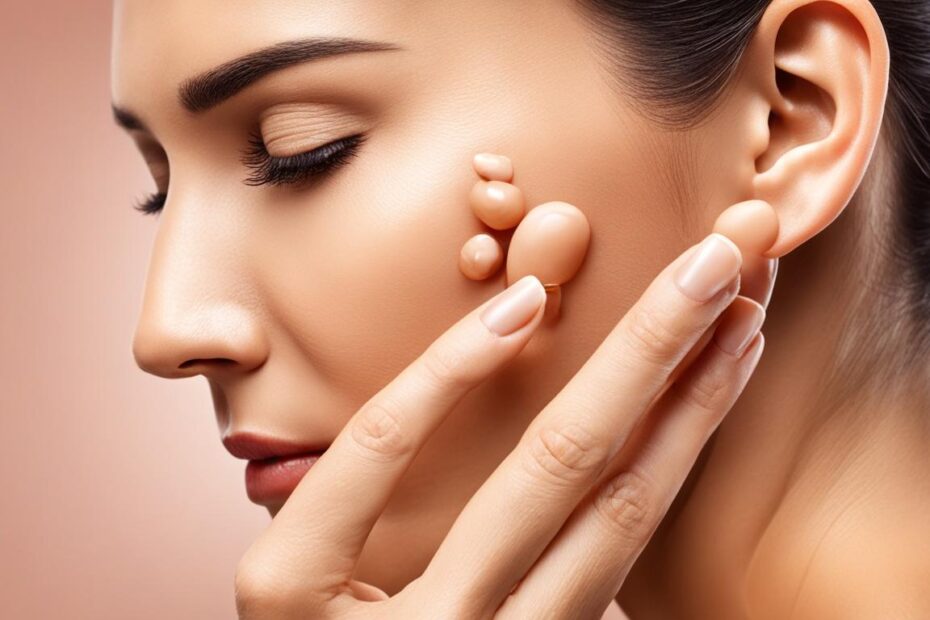Are you tired of dealing with earaches and infections? Looking for natural remedies to alleviate your discomfort? You might be surprised to learn that castor oil, derived from the seeds of the castor plant, could offer soothing benefits for your ear health. Many people have found relief from earwax buildup, infections, and dryness by using castor oil. Let’s explore how this natural remedy can help you find comfort and ease in your ear troubles.
Key Takeaways:
- Castor oil has been used for centuries for its medicinal properties.
- It may provide benefits such as softening earwax and relieving ear infections.
- Consult with a healthcare professional before using castor oil in your ear.
- Follow proper application guidelines and choose a high-quality castor oil.
- Consider other natural remedies for ear infections, but seek professional medical attention for severe symptoms.
How to Use Castor Oil for Ear Health: Safe Application Tips
When it comes to using castor oil for ear health, proper application techniques are crucial to ensure safe and effective use. Here are some steps to guide you:
- Tilt Your Head: To begin, tilt your head to the side with the affected ear facing upward. This position allows easy access to the ear canal.
- Straighten the Ear Canal: Gently pull your earlobe to straighten the ear canal. This helps create a direct pathway for the castor oil to enter.
- Apply the Castor Oil: Using a clean dropper, carefully place a few drops of castor oil into the ear canal. Be cautious not to insert the dropper too deeply as it may cause discomfort or damage.
- Penetration Time: Stay in the tilted position for a few minutes to allow the castor oil to penetrate the ear canal effectively. This allows the oil’s properties to work on softening earwax or providing relief for ear pain.
- Remove Excess Oil: After the designated time, gently wipe away any excess or spilled oil with a clean tissue. It is important to avoid excessive oil build-up in the ears.
While castor oil can potentially help with conditions like earwax buildup and ear pain, it is crucial to exercise caution and seek professional advice before use. Consulting with a healthcare professional, especially if you have underlying ear conditions or are prone to ear infections, is recommended for personalized guidance.
Natural Remedies for Ear Infections: Other Alternatives to Consider
While castor oil may provide some relief for ear infections, there are also other natural remedies worth considering. These alternatives can help alleviate symptoms and promote healing without relying solely on medication. Here are some effective options to explore:
1. Essential Oils
Essential oils like tea tree oil and lavender oil have powerful antimicrobial properties that can help fight off bacteria or fungi causing the ear infection. These oils can also provide soothing relief from pain and discomfort. To use essential oils, dilute a few drops in a carrier oil such as olive oil or coconut oil, and apply a small amount to the outer ear using a clean cotton ball.
2. Breast Milk
Believe it or not, breast milk contains antibodies and natural antimicrobial properties that can aid in fighting off ear infections. Breast milk has been used as a natural remedy for various ailments, including ear infections. Simply express a few drops of breast milk and gently place it in the infected ear using a clean dropper. Repeat this process several times a day for maximum benefits.
3. Coconut Oil
Coconut oil is known for its antimicrobial and anti-inflammatory properties. It can help soothe the ear and fight off the infection-causing pathogens. Warm a small amount of coconut oil and carefully apply it around the infected ear. Remember to always use organic, cold-pressed coconut oil for the best results.
4. Hydrogen Peroxide
Hydrogen peroxide is a common household item that can be used to clean the ears and remove excess earwax, which can contribute to ear infections. Dilute hydrogen peroxide with equal parts of water and use a clean dropper to apply a few drops into the affected ear. Leave it for a couple of minutes, and then tilt your head to allow the solution to drain out. Be sure to consult with a healthcare professional before using hydrogen peroxide and follow their guidance.
Note: It’s important to remember that these natural remedies should not replace proper medical care. If you’re experiencing severe pain, high fever, or other concerning symptoms, it’s best to seek professional medical attention.
Using natural remedies can be a complementary approach to conventional treatment. However, individual results may vary, and it’s crucial to consult with a healthcare professional before trying any new remedy or if the symptoms persist.

| Remedy | Key Benefits | Application |
|---|---|---|
| Essential oils | Antimicrobial properties, pain relief | Dilute and apply to outer ear |
| Breast milk | Antibodies, antimicrobial properties | Express a few drops and apply using a dropper |
| Coconut oil | Antimicrobial, anti-inflammatory properties | Apply around the infected ear |
| Hydrogen peroxide | Earwax removal, cleansing | Dilute and apply using a dropper |
Conclusion: Prioritize Ear Care with Caution and Professional Guidance
When it comes to maintaining ear health, natural remedies like castor oil can be tempting. However, it’s crucial to approach these options with caution and seek professional guidance. Consulting with a healthcare professional before using castor oil or any other remedies in your ear is essential, especially if you have underlying ear conditions or are prone to infections.
While natural remedies may offer potential benefits for ear health, it’s important to remember that they should not replace proper medical care. Prioritizing your overall well-being means seeking appropriate medical treatment for any concerning ear-related issues.
So, if you’re considering using castor oil or other natural remedies for your ears, take the time to consult with a healthcare professional. They can provide you with personalized advice and determine the best course of action for your specific situation. By prioritizing caution and professional guidance, you can ensure that you’re taking the necessary steps to care for your ears effectively.
FAQ
Can castor oil be used behind the ear?
Yes, some people claim that castor oil can provide benefits for ear health when used behind the ear. However, it’s important to exercise caution and consult with a healthcare professional before using castor oil in this way.
What are the benefits of castor oil for the ear?
Castor oil is believed to have several potential benefits for ear health, including softening and dissolving earwax, relieving ear infections, and moisturizing dry and itchy ears. However, it’s important to note that scientific evidence is limited, and it’s best to consult with a healthcare professional before using castor oil for these purposes.
How do you use castor oil for ear health?
To use castor oil for ear health, tilt your head to the side and gently pull your earlobe to straighten the ear canal. Use a clean dropper to place a few drops of castor oil into the ear canal. Stay in the tilted position for a few minutes to allow the oil to penetrate. Gently wipe away any excess oil with a clean tissue. However, it’s important to seek professional guidance before using castor oil in your ear, especially if you have underlying ear conditions or are prone to infections.
Are there any other natural remedies for ear infections?
Yes, there are other natural remedies worth considering for ear infections. Essential oils like tea tree oil and lavender oil have antimicrobial properties and can help alleviate pain and fight off bacteria or fungi in the ear. Breast milk, coconut oil, and hydrogen peroxide are also natural options that may provide relief. However, it’s important to note that these remedies should not replace proper medical care, and it’s best to consult with a healthcare professional for guidance.
What should I prioritize in ear care?
When it comes to ear care, it’s essential to prioritize your overall well-being and seek appropriate medical treatment for any concerning ear-related issues. While castor oil and other natural remedies may offer potential benefits, it’s crucial to approach them with caution and seek professional guidance. Remember that natural remedies should complement proper medical care, rather than replace it.





